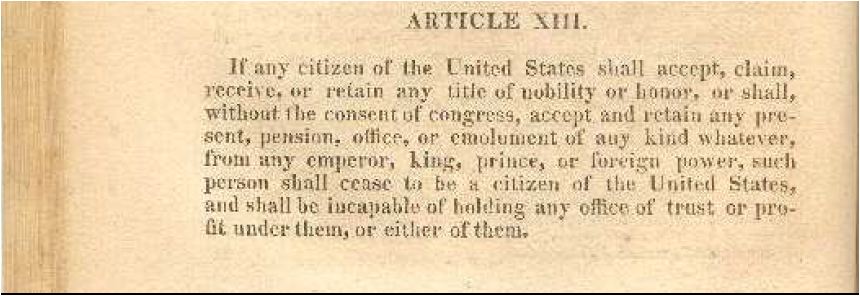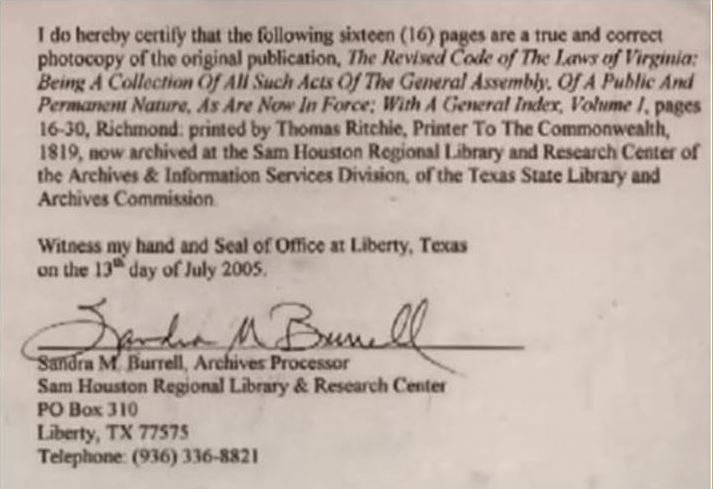Our early legislators were so concerned regarding the "still" close relationship with the British Crown hence Article I, Section 9, Clause 8 which is included in the Constitution.
In 1789 Senator Tristrain Dalton (MA) proposed an Amendment seeking to prohibit and provide a penalty for ANY American accepting a "title of nobility" (RG 46 Records of the U.S. Senate). Although it wasn't passed, this was the first time a "title of nobility" amendment was proposed.
1810 - 1810 - twenty years after the original suggestion of an Amendment referring to "title of Nobility", Senator Reed proposed another "Title of Nobility" Amendment (History of Congress, Proceedings of the Senate, p. 529-530). On April 27, 1810, the Senate voted to pass this 13th Amendment by a vote of 26 to 1; the House resolved in the affirmative 87 to 3; and the following resolve was sent to the States for ratification: "If any citizen of the United States shall accept, claim, receive or retain any title of nobility or honour, or shall, without the consent of Congress, accept and retain any present, pension, office or emolument of any kind whatever, from any emperor, king, prince or foreign power, such person shall cease to be a citizen of the United States, and shall be incapable of holding any office of trust or profit under them, or either of them."
Understanding the reasoning behind the Original 13th Amendment is very important. Even in the 1700 & 1800's, most of our federally elected representatives and senators were lawyers by profession. It is true, the principle intent of the Original 13th Amendment was to prohibit lawyers from serving in the government.
When first reading the Original 13th Amendment, with its references to "nobility", "honour", "emperor", "king" would lead most to dismiss the amendment as a petty document carrying no weight.
In 1789 Senator Tristrain Dalton (MA) proposed an Amendment seeking to prohibit and provide a penalty for ANY American accepting a "title of nobility" (RG 46 Records of the U.S. Senate). Although it wasn't passed, this was the first time a "title of nobility" amendment was proposed.
1810 - 1810 - twenty years after the original suggestion of an Amendment referring to "title of Nobility", Senator Reed proposed another "Title of Nobility" Amendment (History of Congress, Proceedings of the Senate, p. 529-530). On April 27, 1810, the Senate voted to pass this 13th Amendment by a vote of 26 to 1; the House resolved in the affirmative 87 to 3; and the following resolve was sent to the States for ratification: "If any citizen of the United States shall accept, claim, receive or retain any title of nobility or honour, or shall, without the consent of Congress, accept and retain any present, pension, office or emolument of any kind whatever, from any emperor, king, prince or foreign power, such person shall cease to be a citizen of the United States, and shall be incapable of holding any office of trust or profit under them, or either of them."
Understanding the reasoning behind the Original 13th Amendment is very important. Even in the 1700 & 1800's, most of our federally elected representatives and senators were lawyers by profession. It is true, the principle intent of the Original 13th Amendment was to prohibit lawyers from serving in the government.
When first reading the Original 13th Amendment, with its references to "nobility", "honour", "emperor", "king" would lead most to dismiss the amendment as a petty document carrying no weight.
|
|
In 1812, the votes of 13 states were needed to ratify an amendment.
The federal government admits the Titles of Nobility Amendment was ratified by 12: 1. Maryland (December 25, 1810) 2. Kentucky (January 31, 1811) 3. Ohio (January 31, 1811) 4. Delaware (February 2, 1811) 5. Pennsylvania (February 6, 1811) 6. New Jersey (February 13, 1811) 7. Vermont (October 24, 1811) 8. Tennessee (November 21, 1811) 9. Georgia (November 22, 1811) 10. North Carolina (December 23, 1811) 11. Massachusetts (February 27, 1812) 12. New Hampshire (December 9, 1812) 13. Virginia ratified the amendment on February 7, 1812. The state's official records were burned when the British set fire to Washington and Richmond during the War of 1812, but numerous other records prove the amendment was ratified. Nevertheless, the federal government insists the amendment never became law. Of course they do! |
Your browser does not support viewing this document. Click here to download the document.
| 1819_united_states_constitution_attested_a.pdf | |
| File Size: | 2523 kb |
| File Type: | |
The Revised Code of the Laws of Virginia 1819
Original 13th Amendment
To read this document, please scroll down with the slide tab on the right.
Your browser does not support viewing this document. Click here to download the document.
| the_revised_1819_code_of_the_laws_of_virginia_663_pages.pdf | |
| File Size: | 73964 kb |
| File Type: | |


